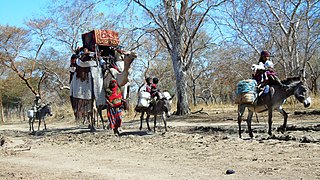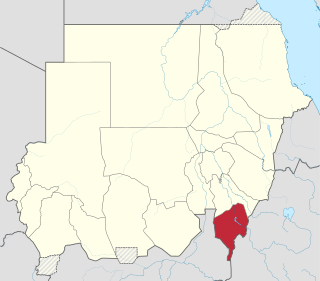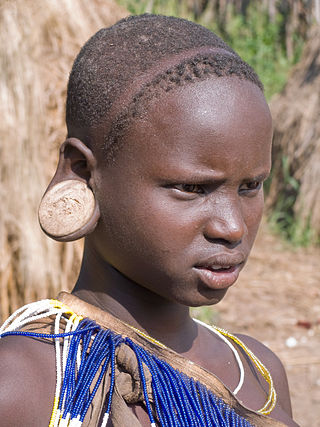
Sudan, officially the Republic of the Sudan, is a country in Northeast Africa. It borders the Central African Republic to the southwest, Chad to the west, Egypt to the north, Eritrea to the northeast, Ethiopia to the southeast, Libya to the northwest, South Sudan to the south, and the Red Sea. It has a population of 45.7 million people as of 2022 and occupies 1,886,068 square kilometres, making it Africa's third-largest country by area and the third-largest by area in the Arab League. It was the largest country by area in Africa and the Arab League until the secession of South Sudan in 2011; since then both titles have been held by Algeria. Its capital and most populous city is Khartoum.
The Nilotic peoples are people indigenous to the Nile Valley who speak Nilotic languages. They inhabit South Sudan, Sudan, Ethiopia, Uganda, Kenya, the eastern border area of Democratic Republic of the Congo, Rwanda, Burundi and Tanzania. Among these are the Burun-speaking peoples, Teso people also known as Iteso or people of Teso, Karo peoples, Luo peoples, Ateker peoples, Kalenjin peoples, Karamojong people also known as the Karamojong or Karimojong, Datooga, Dinka, Nuer, Atwot, Lotuko, and the Maa-speaking peoples.
Nubians are a Nilo-Saharan ethnic group indigenous to the region which is now Northern Sudan and southern Egypt. They originate from the early inhabitants of the central Nile valley, believed to be one of the earliest cradles of civilization. In the southern valley of Egypt, Nubians differ culturally and ethnically from Egyptians, although they intermarried with members of other ethnic groups, especially Arabs. They speak Nubian languages as a mother tongue, part of the Northern Eastern Sudanic languages, and Arabic as a second language.

The Kakwa people are a Nilotic ethnic group and part of the Karo people found in north-western Uganda, south-western South Sudan, and north-eastern Democratic Republic of the Congo, particularly to the west of the White Nile river.

The Luo, are several ethnically and linguistically related Nilotic ethnic groups that inhabit an area ranging from Egypt and Sudan to South Sudan and Ethiopia, through Northern Uganda and eastern Congo (DRC), into western Kenya, and the Mara Region of Tanzania. Their Luo languages belong to the western branch of the Nilotic language family.

The Baggāra or Chadian Arabs are a nomadic confederation of people of mixed Arab and Arabized indigenous African ancestry, inhabiting a portion of the Sahel mainly between Lake Chad and the Nile river near south Kordofan, numbering over six million. They are known as Baggara and Abbala in Sudan, and as Shuwa Arabs in Cameroon, Nigeria and Western Chad. The term Shuwa is said to be of Kanuri origin.

Blue Nile State is one of the eighteen states of the Republic of the Sudan. It was established by presidential decree nº 3 in 1992 and it is named after the Blue Nile River.
The Nuba people are indigenous inhabitants of central Sudan. The Nuba are made up of 50 various indigenous ethnic groups who inhabit the Nuba Mountains of South Kordofan state in Sudan, encompassing multiple distinct people that speak different languages which belong to at least two unrelated language families. Since 2011, when the southern part of Sudan became an independent state as South Sudan, the Nuba now live in the southern part of Sudan. Estimates of the Nuba population vary widely; the Sudanese government estimated that they numbered 2.07 million in 2003.

The Bari are a tribe of South Sudan in East Africa they are Nilotic people inhabiting South Sudan. The Bari speak the Bari language as a mother tongue, which belongs to the Nilotic family.

The Shilluk is a major Luo Nilotic ethnic group that resides in the northeastern Upper Nile state of South Sudan on both banks of the Nile River in Malakal. Before the Second Sudanese Civil War, the Shilluk also lived in settlements on the northern bank of the Sobat River, close to where the Sobat joins the Nile.

The Anyuak, also known as Anyuaa and Anywaa, are a Luo Nilotic ethnic group inhabiting parts of East Africa. The Anuak belong to the larger Luo family group. Their language is referred to as Dha-Anywaa. They primarily reside in the Gambela Region of western Ethiopia, and South Sudan. Group members number between 200,000 and 300,000 people worldwide. Many of the Anyuak people now follow Christianity. It is one of the first of the Nilotic groups to become almost entirely Christian, following the Shilluk people.

The Lugbara are a Central Sudanic ethnic group who live primarily in the West Nile region of Uganda, in the adjoining area of the Democratic Republic of the Congo (DRC) with a few living in South Sudan. They speak the Lugbara language, a Central Sudanic language similar to the language spoken by the Madi, with whom they also share many cultural similarities.
The Maba, also called Bargo or Wadai people, are a Sunni Muslim ethnic group found primarily in the mountains of Wadai region in eastern Chad and southern Sudan. Their population is estimated to be about 542,000. Other estimates place the total number of Bargo people in Sudan to be about 28,000.
The Bongo are a Central Sudanic speaking ethnic group, living at the eastern side of the Albert Nile River in northwestern Uganda and in neighbouring South Sudan in small, scattered settlements south and east of Wau. They speak the Bongo language, one of the Bongo-Baka languages. In the early 1990s, their number was estimated at 200.000 people, with 40% Muslims. Unlike the Dinka and other Nilotic ethnic groups, the Bongo are not a cattle herding people and do not use cows for bride price. Subsistence farming and hunting is the primary source of food, though money is obtained by working in forestry, building, selling honey, and other various means. Before imported metalwork became available, they were known for their traditional production of iron tools.

The Shilluk Kingdom, dominated by the Shilluk people, was located along the left bank of the White Nile in what is now South Sudan and southern Sudan. Its capital and royal residence were in the town of Fashoda. According to Shilluk folk history and neighboring accounts, the kingdom was founded by Nyikang, who probably lived in the second half of the 15th century. A Nilotic people, the Shilluk managed to establish a centralized kingdom that reached its apogee in the late 18th and early 19th centuries, during the decline of the northern Funj Sultanate. In the 19th century, the Shilluk were affected by military assaults from the Ottoman Empire, resulting in the destruction of the kingdom in the early 1860s. The Shilluk king is currently not an independent political leader, but a traditional chieftain within the governments of South Sudan and Sudan. The current Shilluk king is Reth Kwongo Dak Padiet who ascended to the throne in 1993.

Suri is a collective name for three ethnic groups mainly living in Suri woreda, in southwestern Ethiopia. They share many similarities politically, territorially, culturally and economically but speak different languages. They all speak South East Surmic languages within the Nilo-Saharan language family, which includes the Mun, Majang, and Me'en people's languages.

South Sudan, officially the Republic of South Sudan, is a landlocked country in eastern Central Africa. It is bordered by Ethiopia, Sudan, the Central African Republic, the Democratic Republic of the Congo, Uganda, and Kenya, and includes the vast swamp region of the Sudd, formed by the White Nile and known locally as the Bahr al Jabal, meaning "Mountain Sea". The population was 11,088,796 in 2023, and Juba is the capital and largest city. South Sudan gained independence from Sudan on 9 July 2011, making it the most recent sovereign state or country with widespread recognition as of 2024.

The culture of South Sudan encompasses the religions, languages, ethnic groups, foods, and other traditions of peoples of the modern state of South Sudan, as well as of the inhabitants of the historical regions of southern Sudan.

South Sudan is home to around 60 indigenous ethnic groups and 80 linguistic partitions among a 2021 population of around 11 million. Historically, most ethnic groups were lacking in formal Western political institutions, with land held by the community and elders acting as problem solvers and adjudicators. Today, most ethnic groups still embrace a cattle culture in which livestock is the main measure of wealth and used for bride wealth.
Southern Burun is a Western Nilotic language of Sudan. It is a dialect continuum with Burun proper, Mabaan/Ulu, and Jumjum.












